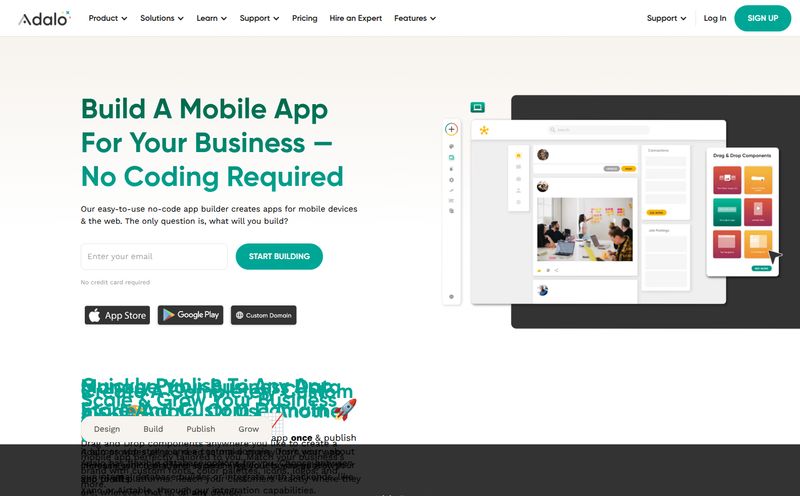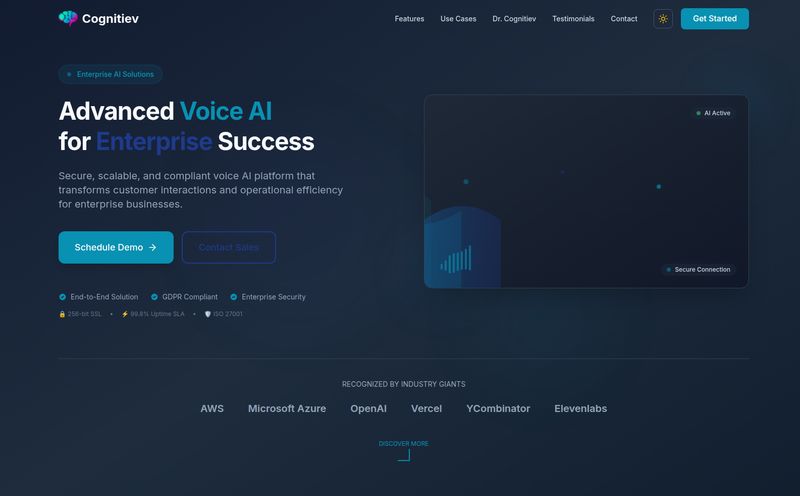We’ve all been there. You’re staring at your screen, deep in the zone, and you hit a wall. So you turn to your new AI coding buddy—ChatGPT, Claude, maybe Gemini—and you ask it to whip up a quick function or help you squash a bug. And what do you get back? Something… generic. Something that would work in a perfect, context-free vacuum, but has absolutely no idea about the weird, wonderful, and slightly chaotic ecosystem of your actual codebase.
It's a pain. A real, honest-to-goodness pain. I’ve spent more hours than I care to admit trying to explain the intricate architecture of a legacy project to a language model that has the memory of a goldfish. You paste in one file, it forgets the last. It's like hiring a brilliant consultant but forgetting to give them the project brief and access to the company files.
That's the problem a new tool on the block, GitGab, is trying to solve. And honestly? I'm here for it.
So, What Exactly is GitGab?
Think of GitGab as a super-smart librarian for your AI assistant. It doesn't replace ChatGPT, Claude, or Gemini. Instead, it connects them directly to your code repositories on GitHub. Its a simple idea, but a powerful one. By giving these large language models (LLMs) the full context of your project—all the files, the dependencies, the structure—it allows them to give you answers that are not just smart, but relevant.
Suddenly, the AI isn't just guessing. It's reading. It's understanding how `module-A.js` interacts with `service-B.ts`. It can see the custom error handling you wrote three months ago. This simple bridge from your code to the AI's 'brain' is what makes all the difference, turning a general-purpose tool into a specialized, project-aware partner.

Visit GitGab
Why Code Context is an Absolute Game-Changer
For years, the promise of AI-assisted coding has been dangling in front of us. We've seen glimpses of brilliance, but the lack of context has always been the Achilles' heel. Without it, you're the one doing all the heavy lifting, spoon-feeding snippets of code and hoping the AI connects the dots. It's inefficient and, frankly, exhausting.
GitGab changes that dynamic. When your AI can read your whole repo, its capabilities expand dramatically.
From Frustrating Bug Hunts to Focused Fixes
Ever tried to describe a bug to an AI? "It's throwing a null reference error, but only when the user is logged in and the moon is in waxing gibbous." Good luck. With GitGab, you can just say, "There's a bug in the user authentication flow, can you look at `authController.js` and `userModel.js` and tell me what’s wrong?" The AI now has the files it needs. It can trace the logic, spot the potential issue, and suggest a fix that actually fits your coding style and architecture. It's the difference between asking a stranger for directions and asking a local who knows all the back-alleys.
Writing Documentation That Doesn't Suck
I don't know a single developer who loves writing documentation. It's a necessary evil. But what if your AI could do the grunt work? With full repo access, you can ask it to generate README files, write JSDoc comments for complex functions, or even create a high-level overview of how different microservices interact. Because it understands the code, the documentation it produces is specific and genuinely useful, not just a generic template.
My First Look: Getting Started with GitGab
Getting set up is pretty straightforward, with one little gatekeeper: you need a GitHub account. Which, let's be fair, if you're the target audience for this tool, you probably have one. You sign in with GitHub, grant it access to the repositories you want it to work with, and you're pretty much ready to roll. I was pleasantly surprised to see they also support connecting local files, which is a huge plus for those little side-projects or sensitive codebases that don't live on the public web.
You then choose your AI champion—ChatGPT, Claude, or Gemini. The flexibility here is a major win in my book. Some days I feel like Claude is better for creative refactoring, while Gemini might be sharper for raw logic. Not being locked into one ecosystem is a smart move.
The Good, The Bad, and The Code
No tool is perfect, right? After poking around, here’s my honest take on where GitGab shines and where you might want to pause for thought.
What I Really Liked
The core value proposition is, without a doubt, its biggest strength. The accuracy of the AI's suggestions goes through the roof when it has context. It feels less like a magic trick and more like a real tool. Beyond that, the multi-model support is fantastic. It future-proofs the platform a bit; as new and better models come out, presumably GitGab can just add them to the roster. They also make a point of mentioning data privacy, which is a big check in the pro column for me. The idea of feeding my entire private codebase into an AI can be a little unnerving, so any reassurance on that front is welcome.
A Few Caveats
The reliance on a GitHub account is the most obvious hurdle. If your team uses GitLab or Bitbucket exclusively, you might be out of luck for now. The other point is the pricing model. While there’s a free trial with some tokens to get you started, it eventually moves to a paid system. This isn't a bad thing—developers need to eat!—but it's something to be aware of. You're not just paying for the AI model, you're paying for the 'bridge' that GitGab provides.
Let's Talk Money: GitGab's Pricing Structure
So how much does this magic cost? GitGab offers two distinct pricing tiers, which I appreciate caters to different types of users.
| Plan Type | Cost | Best For |
|---|---|---|
| Pay-as-you-go Tokens | Varies | Occasional users or those who want to experiment with different AI models without a monthly commitment. You buy a batch of tokens for a specific model (e.g., GPT-4) and use them until they run out. |
| Unlimited Subscription | $8 /month | Power users, professional developers, or teams who will be integrating GitGab into their daily workflow. This gives you unlimited access for a flat monthly fee. |
The $8/month unlimited plan seems incredibly reasonable to me, especially if it saves you even a few hours of work each month. For a professional developer, that's a cost that pays for itself almost immediately. The token model is great for hobbyists or people who just need a burst of AI help for a specific project.
Who is GitGab Really For?
After weighing it all up, I think GitGab has a pretty clear audience. This is a tool built by developers, for developers. It's for the freelancer tired of repetitive boilerplate, the startup engineer trying to move fast, and the senior dev on a large team who needs to quickly get up to speed on a new part of the codebase. If you're already using AI to help you code, GitGab feels like the logical next step. It’s the upgrade from a generic pocket knife to a specialized multi-tool designed for the exact job you're doing.
If you're a complete beginner who doesn't use version control, this might be a bit much. But for anyone living in their terminal and committing to GitHub daily, this could very well become an indispensable part of your toolkit.
Frequently Asked Questions
1. Is my code secure when I connect my repository to GitGab?
This is the big question, isn't it? According to their platform, they prioritize data privacy and security. The tool acts as a secure bridge, providing context to the AI models on-demand. However, you should always review the privacy policy of any third-party service you grant access to your code. For highly sensitive or proprietary code, using the local files connection feature might be a more comfortable option.
2. Do I have to pay for both GitGab and the AI model (like ChatGPT Plus)?
That depends on the model and plan. GitGab's pricing is for their service—the contextualization bridge. The costs for the underlying AI models (like from OpenAI or Google) are often bundled into GitGab's token or subscription plans. You typically won't need a separate subscription like ChatGPT Plus, as you're accessing the API through GitGab, but it's always best to check their docs for the most current details.
3. Which AI model should I choose within GitGab?
There's no single 'best' answer! It's a matter of preference and task. As a rough guide from my experience, models like OpenAI's GPT-4 are often great all-rounders for complex logic and refactoring. Anthropic's Claude models can be excellent for more creative or conversational tasks like writing documentation. Google's Gemini is another powerful contender. The best part of GitGab is you can experiment and see which one 'clicks' with your workflow.
4. What happens when I run out of my free trial tokens?
Once your introductory free tokens are used up, you'll need to choose one of the two paid plans to continue using the service: either purchase a new batch of tokens for a specific model or sign up for the $8/month unlimited subscription.
5. Can GitGab help me optimize my code for performance?
Absolutely. This is a great use case. By providing the AI with the relevant functions or even the entire application, you can ask it to identify bottlenecks, suggest more efficient algorithms, or refactor code to reduce complexity and improve speed. The quality of the suggestions will be much higher because the AI can see the bigger picture.
My Final Verdict on GitGab
So, is GitGab the holy grail of AI coding assistants? It's definitely a massive step in the right direction. It solves the single biggest problem with using LLMs for software development: the context gap. By seamlessly connecting our codebases to these powerful AI brains, it elevates them from a clever novelty to a genuinely productive tool.
For a solo dev or a small, agile team, the potential time savings are immense. At $8 for an unlimited subscription, it feels like a no-brainer. If you're serious about integrating AI into your development workflow, you owe it to yourself to give GitGab a try. It might just be the coding buddy you've been searching for.
Reference and Sources
- GitGab Official Website (Note: A placeholder link as the actual URL was not provided)
- OpenAI's ChatGPT
- Anthropic's Claude
- Google's Gemini



